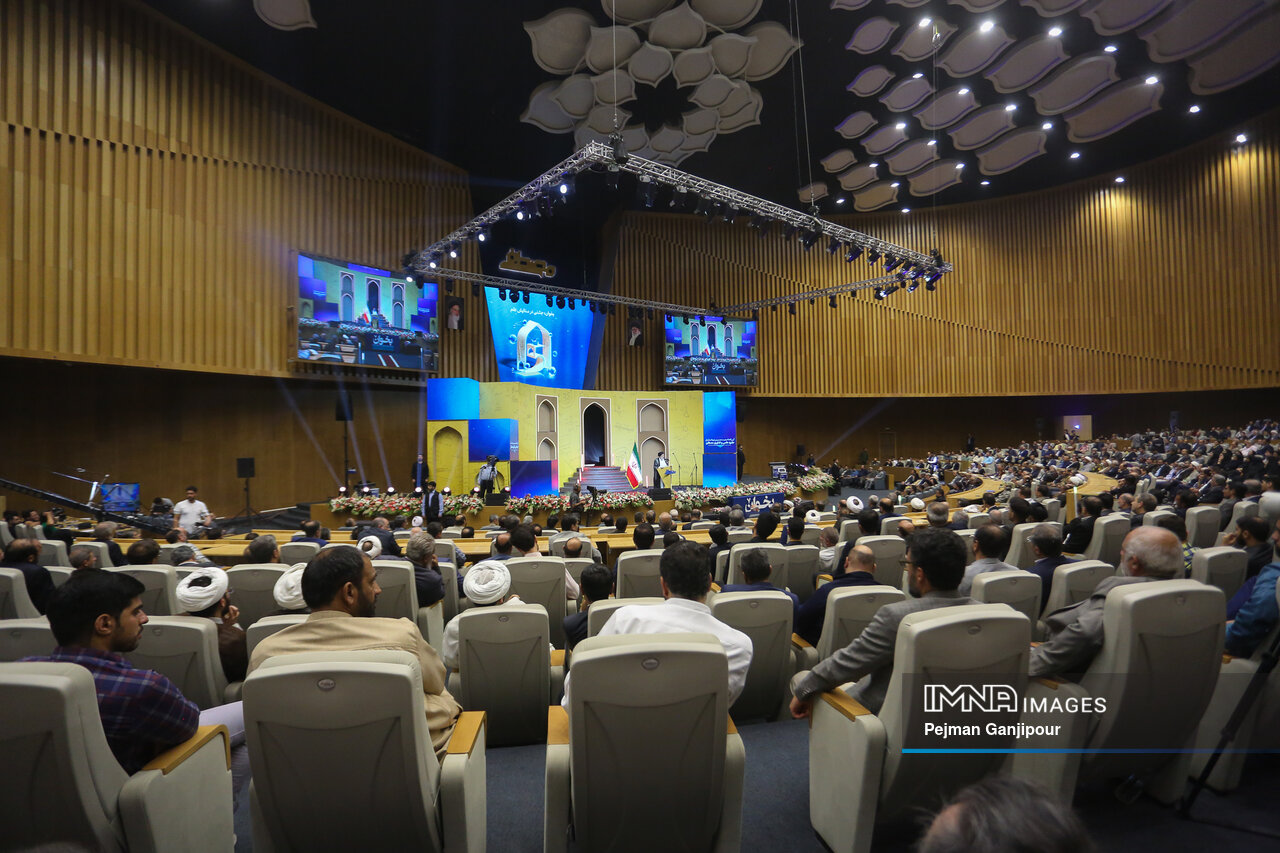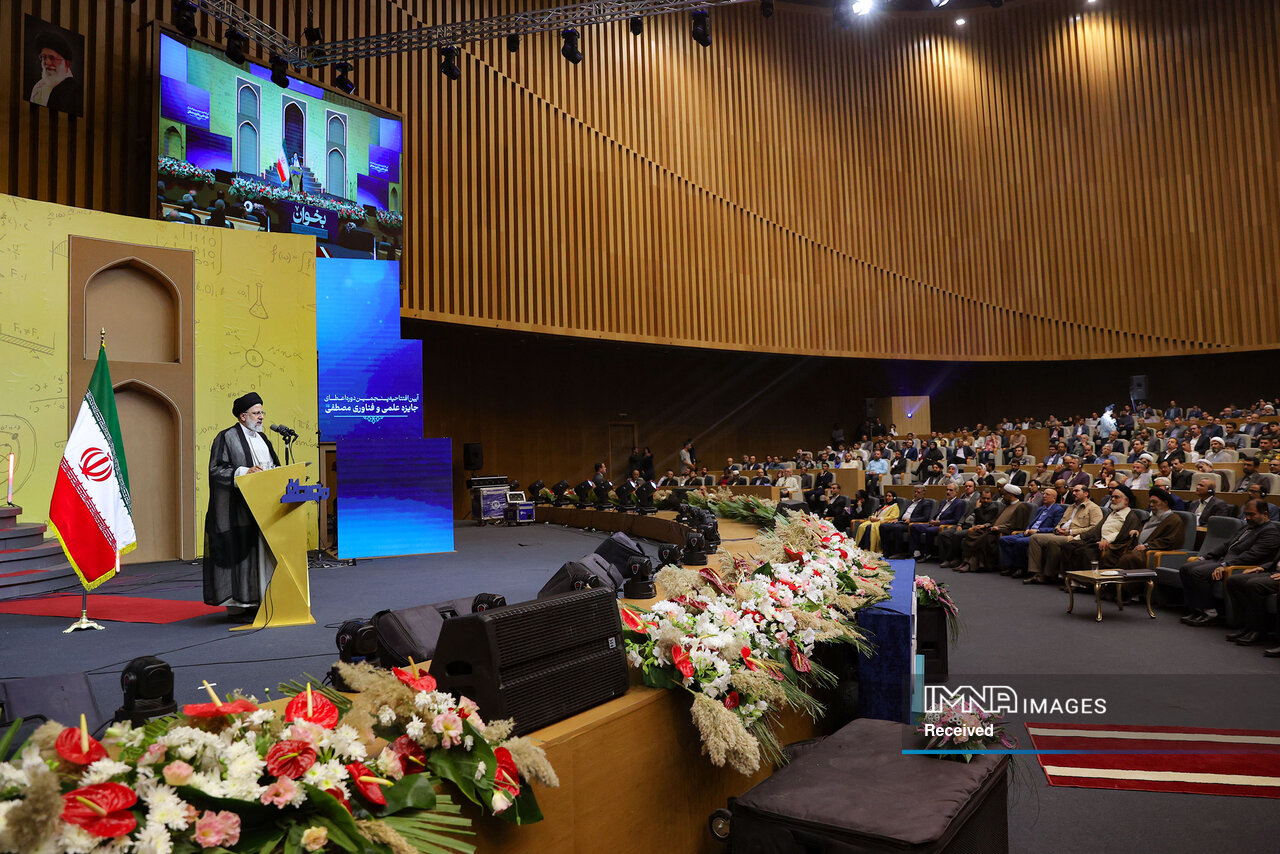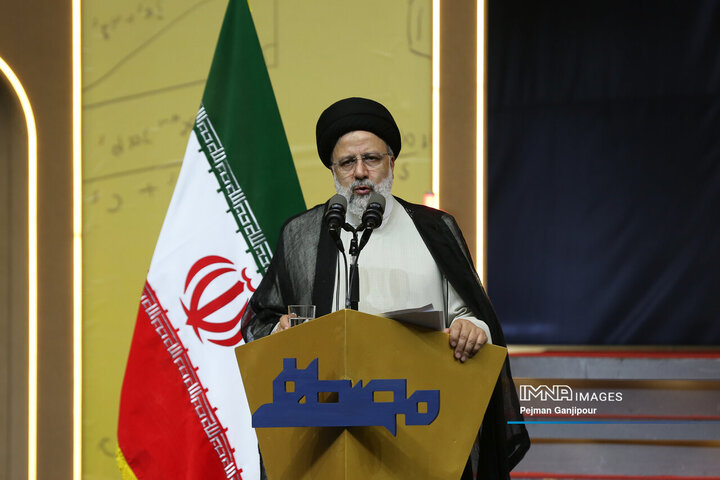President Raisi commenced his address by expressing his heartfelt congratulations on the auspicious occasion of the birth of the Prophet of Islam (PBUH) and Imam Sadiq (PBUH). He further extended his sincere appreciation to the martyrs, particularly the 24,000 valiant martyrs of Isfahan, while also conveying his well wishes to the veterans.
Drawing upon a profound narration from the Prophet, President Raisi emphasized the significance of knowledge in three aspects: divine thoughts and beliefs, virtuous and generous morals, and the lifestyle of those who seek God. He elucidated that this knowledge encompasses beneficence, a science that unlocks prosperity, salvation, and the unraveling of mysteries, utilizing the inherent capacities bestowed by God within nature to bring humanity closer to its ultimate purpose.
Ayatollah Raisi highlighted the significance of incorporating monotheistic principles into the teachings of various fields and universities. The Iranian President expressed his belief that knowledge rooted in monotheism holds the key to advancing human civilization and fostering happiness among people. According to Ayatollah Raisi, irrespective of the specific scientific discipline, the presence of a monotheistic foundation ensures that progress is achieved without any distinction.

During his address, Ayatollah Raisi also drew attention to the potential dangers posed by science when it is solely driven by motives such as power, wealth accumulation, colonization, and exploitation. He cautioned that such misguided pursuits can ultimately lead to the destruction of humanity. The Ayatollah cited instances where certain scientists' sole focus on destructive capabilities has resulted in the proliferation of harmful scientific formulas and tools.
Furthermore, the President underscored the historical significance of Islam's scientific contributions. Beginning with the advent of the Prophet's mission, Islamic civilization witnessed a remarkable scientific movement that propelled the Islamic world forward. This scientific momentum reached its pinnacle in the second century, establishing a noticeable disparity between the scientific achievements of the Islamic world and Europe.
Ayatollah Raisi's remarks shed light on the critical role that monotheistic principles play in shaping the pursuit of knowledge and scientific advancements. By aligning scientific endeavors with moral values, Ayatollah Raisi believes that societies can foster progress and ensure the well-being of humanity.
Iran's President emphasized the strong civilizational background of Muslims and expressed concerns about the West's reaction to its revival. He pointed out that Muslim scientists, such as Khwarazmi, have made significant contributions to various fields, including algebra, which serves as the scientific foundation for nanotechnology, biotechnology, and intelligence.
Drawing attention to the achievements of renowned Muslim scientists like Ibn Sina, Ayatollah Raisi highlighted the presence of shining personalities in the Islamic world. He specifically mentioned Mr. Kazemi Ashtiani, who has helped fulfill the dreams of families by enabling them to have children.
Ayatollah Raisi further stated that the enemies were apprehensive about the formation of a civilization based on religion and the emergence of scientists who could effectively utilize technology. They feared the rise of a rival civilization. However, today, through the Islamic system, communication has been established, and the knowledge and power of Muslim scientists have been harnessed for the benefit of society.

Ayatollah Raeesi delivered a powerful speech emphasizing the importance of respecting scientific gatherings and working towards their enrichment. He put forth a proposal advocating for the inclusion of all sciences and techniques in the prestigious Mustafa (pbuh) award, extending its scope beyond basic sciences to encompass humanities. According to Ayatollah Raeesi, these fields have made significant advancements thanks to the Islamic Revolution and the establishment of the Islamic Republic.
Highlighting the transformative power of science, Ayatollah Raeesi stated that it inspires hope in the hearts of people and serves as a catalyst for overcoming oppression, corruption, and various socio-cultural anomalies. He emphasized the urgent need for practical and beneficial scientific knowledge in today's societies, asserting that it holds greater value than oppressive forces. By eliminating discrimination, injustice, and corruption, science has the potential to shape a brighter future, ensuring that individuals no longer feel marginalized and providing them with a clear vision of what lies ahead.
Expressing gratitude to all the participants of the meeting, Ayatollah Raeesi expressed hope that the convergence of intellectual minds would pave the way for progress and the growth of useful science. It is his belief that this collective effort will bring about positive change in the lives of contemporary individuals, fostering a society that thrives on knowledge and innovation.


Your Comment